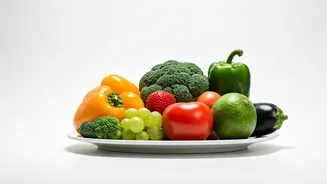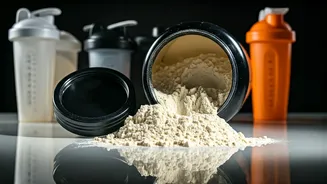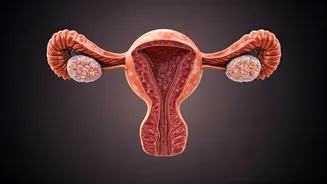Prioritize Balanced Diet
The foundation of any successful weight loss journey begins with what you eat. Focus on a diet rich in whole, unprocessed foods. This entails including
plenty of fruits, vegetables, lean proteins, and whole grains. Reduce the intake of processed foods, sugary drinks, and excessive amounts of saturated and trans fats. The key is portion control and mindful eating. It's about nourishing your body with the nutrients it needs while ensuring you're not overeating. Making these shifts creates a calorie deficit, which is fundamental to burning stored fat. Try planning your meals for the week to stay on track, and consider prepping ingredients in advance to avoid unhealthy impulse choices. Be patient, consistent, and focus on small, sustainable changes to your eating habits.
Hydrate Consistently
Water is your best friend when it comes to losing belly fat. Drinking an adequate amount of water throughout the day supports your body's metabolism and helps you feel fuller, potentially reducing your calorie intake. Aim to drink at least eight glasses of water daily. You might also try drinking a glass of water before each meal to curb your appetite. Staying hydrated also helps flush out toxins and supports overall bodily functions. If plain water feels boring, consider adding slices of lemon, cucumber, or berries for flavor. Keep a water bottle with you at all times to remind you to drink regularly. This small adjustment can contribute significantly to your weight loss efforts and overall well-being.
Embrace Regular Walking
Walking is a gentle yet effective exercise that can significantly aid in shedding belly fat. Commit to walking for at least 30 minutes each day. You can break it down into shorter bursts if needed, such as three 10-minute walks. Walking boosts your metabolism, burns calories, and helps to reduce stress, which can contribute to weight gain. Make walking a non-negotiable part of your day. Incorporate it into your commute, take the stairs instead of the elevator, or go for a brisk walk during your lunch break. Consider using a fitness tracker to monitor your steps and stay motivated. Regular walking doesn’t require any special equipment or skill, making it a truly accessible habit.
Prioritize Adequate Sleep
Quality sleep is a cornerstone of weight management. Aim for 7–9 hours of sleep each night. Sleep deprivation disrupts hormones that regulate appetite, which may result in increased hunger and cravings for unhealthy foods. When you are sleep-deprived, your body produces more cortisol, the stress hormone, which can also promote fat storage. Establish a regular sleep schedule by going to bed and waking up at the same time every day, even on weekends. Create a relaxing bedtime routine to signal your body that it’s time to sleep. This may include taking a warm bath, reading a book, or listening to calming music. Make your bedroom a sleep-conducive environment that is dark, quiet, and cool. Optimizing your sleep is crucial for both your physical and mental health.
Manage Stress Levels
Chronic stress elevates cortisol levels, which can lead to increased abdominal fat storage. Find healthy ways to manage stress. Engage in activities like yoga, meditation, or deep breathing exercises to calm your mind and body. Spend time in nature, listen to music, or pursue hobbies you enjoy. Practice mindfulness and be present in the moment. If stress is overwhelming, consider seeking professional help from a therapist or counselor. It's important to recognize the triggers that cause stress and develop coping mechanisms to mitigate their effects. Reducing stress contributes significantly to your ability to stick to your weight loss goals.
Incorporate Protein Intake
Consuming adequate protein is vital for weight loss. Protein helps you feel full and satisfied, reduces cravings, and supports muscle mass. Aim to include protein in every meal. Good sources of protein include lean meats, poultry, fish, eggs, dairy products, beans, lentils, and tofu. Protein has a higher thermic effect, which means your body uses more energy to digest it, boosting metabolism. If you are exercising, you might need a bit more protein to support muscle repair and growth. Try to distribute your protein intake evenly throughout the day to maximize its benefits. This could involve eating protein-rich breakfasts, including protein in your lunch, and consuming a protein snack in the afternoon.
Limit Alcohol Consumption
Alcohol contains empty calories and can hinder your weight loss efforts. Excessive alcohol intake can interfere with the body's ability to burn fat and can increase belly fat storage. It can also lead to poor food choices and overeating. If you choose to drink alcohol, do so in moderation. Women should have no more than one drink per day, and men should have no more than two drinks per day. Choose healthier alcoholic beverages, such as light beer or wine, and avoid sugary mixers. Consider having alcohol-free days and alternate alcoholic drinks with water to stay hydrated. By decreasing your alcohol consumption, you are supporting your overall health and weight loss journey.



















